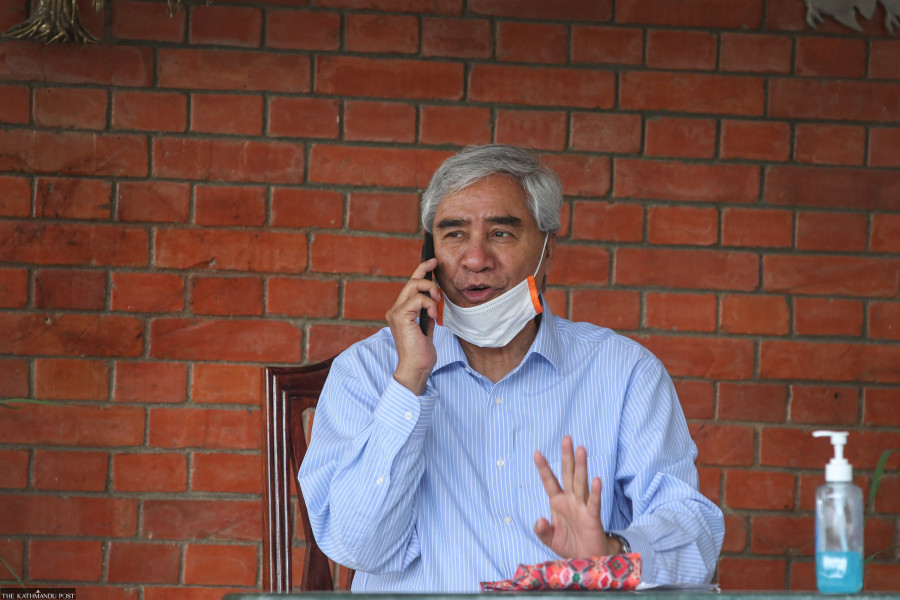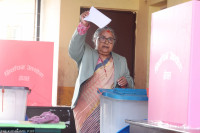Politics
Deuba has struggled to form the Cabinet. He lacks team of advisers as well
In the absence of ministers, role of persons with expertise can be crucial in governance, but Congress leaders say the prime minister is waiting to give government full shape.
Anil Giri
Prime Minister Sher Bahadur Deuba has his plate full: from addressing the demands of his coalition partners who have their own interests to managing factions within his own Nepali Congress, which is struggling to hold its general convention; from reviving a pandemic-hit economy to steering a directionless foreign policy. Then he has to have one eye on the general elections due less than 18 months away.
Even one month after assuming office, he has not been able to give the full shape to his government.
At such a time, a group of advisers well-versed on specific fields of expertise could be helpful. But Deuba doesn’t have one yet.
“On several technical issues like the press, foreign affairs, security and the economy, the prime minister needs regular advice, feedback and consultations,” said Umesh Mainali, former home secretary and former chairman of the Public Service Commission, stressing the need for advisers.
Although there are ministries dedicated to run the country, advisers are important because they provide the prime minister with second opinions on crucial issues. When there is a clash of opinions between ministers and the prime minister, discussions at Cabinet meetings resolve issues.
It was Girija Prasad Koirala, who was elected prime minister after the restoration of the multi-party system in 1990 following the end of the 30-year-long partyless Panchayat system, who started the tradition of having a group of advisers.
In 1991, he had appointed Krishna Khanal, a professor of political science at Tribhuvan University, as his political adviser, Jay Prakash Gupta, a journalist, as press adviser, Ramesh Jang Thapa, a retired defence secretary, as security adviser and Dirgha Raj Koirala, a former secretary, as his administrative adviser.
Appointing a team of advisers is mostly a Western-style of governance to make governing and other decision-making processes more consultative whereby heads of state and government can get the right advice on crucial issues related to state affairs.
Since the early 1990s, successive prime ministers of Nepal have continued the tradition of appointing advisers and their picks are watched with great interest.
The prime minister’s advisers are paid for by the state and have the status equivalent to that of Cabinet minister, state minister, assistant minister, and secretary in many cases.
According to Nepali Congress leaders close to Deuba, the prime minister will choose his team of advisers only after the Cabinet gets its full shape. When he was sworn into office on July 13, only four Cabinet ministers were appointed. On July 25, Deuba appointed a minister of state for health.
Deuba is now receiving flak for failing to appoint even ministers at crucial ministries like health and foreign, which can play a crucial role in fighting the pandemic. And with no proper team of people with expertise, governance has been hobbled.
“The prime minister is worried about the delay in Cabinet expansion and formation of his team,” Min Bishowkarma, a leader close to Deuba, told the Post. “The prime minister will constitute his team once the Cabinet gets full shape.”
With the Madhav Kumar Nepal faction of the CPN-UML, which supported Deuba’s bid to become prime minister, undecided about joining the Cabinet and the coalition partners—Communist Party of Nepal (Maoist Centre) and Janata Samajbadi—having too many ministerial aspirants, the Cabinet expansion has been delayed. On top of that, within his Congress party, Deuba has to manage factions led by Ram Chandra Poudel and Krishna Prasad Sitaula.
Meanwhile, Deuba is taking advice from leaders close to him, according to sources within the party. They include party General Secretary Purna Bahadur Khadka, Home Minister Bal Krishna Khand, Law Minister Gyanendra Bahadur Karki, Joint General Secretary Prakash Sharan Mahat, senior leader Ramesh Lekhak and Bishwa Prakash Sharma, the party spokesperson.
Senior party leader Bijaya Kumar Gachhadar, who was released on bail of Rs1 million for his alleged involvement in the Baluwatar land scam a day after Deuba was sworn in as prime minister, Bishowkarma and NP Saud also regularly visit Baluwatar to advise the prime minister.
Just like for ministerial berths, there is no dearth of aspirants for advisers.
“A large number of aspirants are lobbying to become advisers and part of his advisory and technical teams,” Bishwakarma told the Post.
Sources told the Post that Deuba is looking to appoint one chief political adviser for which three names are under consideration—Mahat, Lekhak and Sharma.
Former foreign secretaries and ambassadors Gyan Chandra Acharya and Madhu Raman Acharya, and Geja Sharma Wagle, a political analyst, are also in the race to become the foreign relations adviser. Dinesh Bhattarai, who has been foreign relations adviser to Deuba and former prime minister Sushil Koirala, and Chief Secretary Shanker Das Bairagi, who is also a former foreign secretary, have been advising Deuba on foreign affairs, according to sources.
Shankar Sharma, former vice-chairman of the National Planning Commission, economist Prabhu Budhatoki, and Acharya, the former diplomat, are vying for the post of economic adviser.
Govinda Pariyar, who served as Deuba’s press adviser during his fourth inning as prime minister in 2017-18, is currently advising him on press related matters.
“I am assisting the prime minister where necessary, though I am not formally appointed,” Pariyar told the Post.
Some journalists close to the Nepali Congress and those who have worked in various capacities in the party's sister organisation, Press Union Nepal, and in the Federation of Nepali Journalists, the umbrella organisation of Nepali journalists, are also lobbying to become the press adviser.
“The role of advisers and team members of the prime minister is crucial and important. We have told him to learn from the mistakes of the erstwhile prime minister KP Sharma Oli,” a leader close to Deuba, who did not wish to be named, told the Post.
“The reason behind Oli’s failure was the poor role and performance of his advisers, so Deuba must be cautious while forming his team.”
At present, Deuba’s relative and his longtime aide Bhanu Deuba is scheduling his meetings and other managerial issues at Baluwatar and he is likely to become chief personal assistant to the prime minister.
Birendra Thapa is serving Deuba as a personal assistant and an under-secretary from the Office of the Prime Minister and Council of Ministers has been deputed to liaise between Deuba’s office at Singha Durbar and his official residence at Baluwatar.
While it was also said that Oli did not take advice and instead took decisions on his own, Deuba’s former advisers say he listens to his advisers and does not interfere much in their jobs.
“Although we do not have a culture of taking advisers seriously, I find Deuba a bit different,” said Khem Raj Regmi, a former secretary who worked as Deuba’s chief personal assistant in 2005.
“Deuba listened to grievances and never rejected them outright. He listened thoroughly and placed instructions accordingly. He hardly argued with his advisers because most of the time, we were given a free hand. That made it easy to work.
But that was nearly two decades ago. In the interim, Arzu Deuba, the prime minister’s wife, has become a force in her own right and to be reckoned as the unofficial chief adviser, according to leaders close to Deuba.
“She is always there and she prevails over all advisers,” the Nepali Congress leader said. “For her wide range of connections and exposure in political matters as well as given her professional background [as the operator of educational institutions and leading non-governmental organisations], Deuba listens to her more than anyone else.”




 27.41°C Kathmandu
27.41°C Kathmandu













